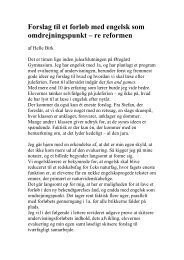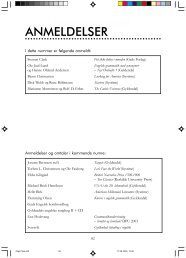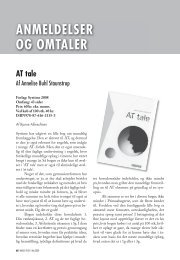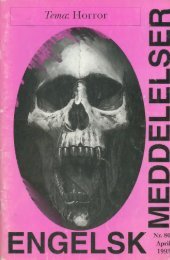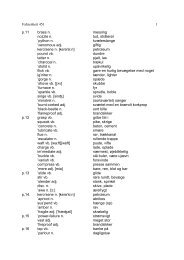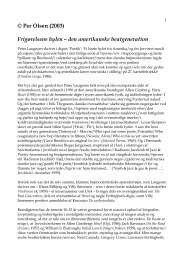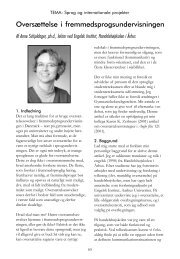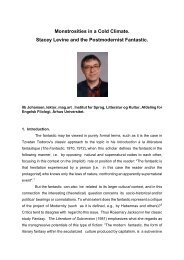REDAKTIONELT - Anglo Files
REDAKTIONELT - Anglo Files
REDAKTIONELT - Anglo Files
You also want an ePaper? Increase the reach of your titles
YUMPU automatically turns print PDFs into web optimized ePapers that Google loves.
26<br />
at a recent PEN conference<br />
expressed anger that a Canadian<br />
delegation of 51 contained only<br />
"five or seven" members of<br />
visible minorities, numbers that<br />
would be quite close to their<br />
proportion in the population. The<br />
Charter of Rights and freedoms<br />
and other human rights legislation,<br />
the dominant public<br />
attitudes against racism, and the<br />
educational levels of the<br />
immigrants have given the visible<br />
minorities the means and the<br />
skills that are needed to fight<br />
against racism.<br />
In this context the debates in<br />
the House of Commons and in the<br />
newspapers concerning the bill<br />
to establish a department of<br />
citizenship and multiculturalism<br />
have been of interest. No one<br />
questions that diversity of<br />
population is characteristic of<br />
Canada and also desirable: to do<br />
so given Canada's current low<br />
birthrates would be to question<br />
the desirability of a large and<br />
stable or increasing population,<br />
and in spite of growing<br />
environmental concerns population<br />
decline is still looked upon with<br />
dismay. However, many, including<br />
intended beneficiaries of the<br />
policy, question the necessity<br />
of a separate department of<br />
government of multiculturalism,<br />
seeing it as having to do only<br />
with concerns of the non-British<br />
and non-French and therefore as<br />
being divisive, patronizing and -<br />
NOTES:<br />
1. Freda Hawkins, Critical Years in Immigration:<br />
Canada and Australia Compared<br />
(Montreal: McGill - Queen's University<br />
Press, 1989), p. 214.<br />
2. Abella, I., and H. Troper, None is Too<br />
Many: Canada and the Jews of Europe<br />
1933-1948. (Toronto: Lester and Orpen<br />
Dennys, 1982).<br />
at a time when attention is<br />
focused on budget deficits and<br />
impending new taxes -<br />
unnecessarily expensive:-<br />
The prospective author of<br />
"Multiculturalism: The Other<br />
Side" then has 'a ildmber of<br />
arguments against multicultur<br />
alism to present, and considerable<br />
numbers of peoplo ready to<br />
accept the arguments. - Nonethe-<br />
less, if it is seen as_ having to<br />
do with group understanding and<br />
the combatting of raciSlp on the<br />
one hand and the celebrating of<br />
all Canadian heritages, including<br />
English, Irish, Scottish, Welsh,<br />
French and First Nations as well<br />
as those of other ethnic groups<br />
on the other hand, the policy of<br />
multiculturalism is fully defensible.<br />
Whatever administrative<br />
arrangements are proposed and<br />
however crass the motives are of<br />
those who propose them, in a<br />
polyethnic, multilingual and<br />
multiracial population- such as<br />
Canada's to give symbolic recognition<br />
to diversity, tb monitor<br />
relations between .groups and on<br />
occasion intervene. constructively<br />
and to assist people to maintain<br />
a proud sense of history, are not<br />
ignoble goals. The policy of<br />
multiculturalism near the end of<br />
its second decade is still<br />
necessary and by no means<br />
obsolete.<br />
* * *<br />
3. House of Commons, Debates (May 1,<br />
1947), reprinted in Palmer, Immigration<br />
and the Rise of Multiculturalism,<br />
p. 61.<br />
4. H.B. Hawthorn, ed., A survey of the<br />
contemporary Indians of Canada, 2<br />
vols. (Ottawa, Queen's Printer, 1966,<br />
1967).<br />
S. Royal Commission on Bilingualism and<br />
Biculturalism, Appendix I, Terms of<br />
Reference, Report, Book I (Ottawa:<br />
Queen's Printer, 1967).<br />
6. Rohinton Mistry, Tales from Firozsha<br />
Baag (Markham, Ontario: Penguin<br />
Books, 1987), p. 160.<br />
27<br />
7. In Ontario in 1981, of Philippine immigrants<br />
73.6 per cent had some<br />
post-secondary education and of Indo-<br />
Pakistani immigrants 60.5 had some<br />
post-secondary education, whereas the<br />
figure for Ontario residents of British<br />
descent was 36.3. The Globe and<br />
Mail, 24 January 1986.



